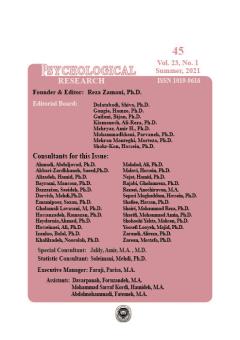-
-
List of Articles
-
Open Access Article
1 - Role of Basic Psychological Needs in Relationship Between Interpersonal Dependency and Mental Health
Nima Ghorbani Atena Heidari reza purhosein -
Open Access Article
2 - Relationship Between Academic Resilience and Academic Engagement: The Mediating Role of Emotional Self-Regulation
masoud gholamali lavasani sogand ghasemzadeh Zahra Panahi Azar Minoo Matbou Riahi -
Open Access Article
3 - Meta-Analysis of the Effectiveness of Interventions on test anxiety reduction
Habib Amani دکتر رامین حبیبی کلیبر abolfazl Farid Syavash Sheykhalizadeh -
Open Access Article
4 - Effectiveness of Compassion-Focused Therapy on Distress Tolerance and Relationship Attributions in Divorcing Women
Vida Azari Kobra Kazemian moghadam Mahnaz Mehrabizadeh Honarmand -
Open Access Article
5 - Effectiveness of Excitement Regulation Program by Emotional Schematic Therapy Method on Distress Tolerance and Empowerment of Mothers with Autistic Children
Naser Yousefi Arman Azizi Masoud Sadeghi Ghaffar Nasiri Hanis Loghman Bajelani Peyman Khorshidi Seyede Samire Hoseini -
Open Access Article
6 - Effectiveness of Acceptance and Commitment Group Therapy on Binge Eating and Body Image Concerns in Sufferers of Binge Eating Disorder
Sadrollah Khosravi sahar esmaeili
-
The rights to this website are owned by the Raimag Press Management System.
Copyright © 2017-2026







